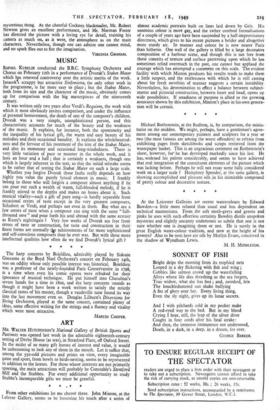MUSIC
RAFAEL KuirEux conducted the B.B.C. Symphony Orchestra and Chorus on February rzth in a performance of Dvorak's Stabat Mater which lias renewed controversy over the artistic merits of the work. Janacek 's scrappy but attractive Sinfonietta, the only other work in the programme, is far more easy to place ; but the Stabat Mater, both from its size and the character of the music, obviously comes up for comparison with the big masterpieces of the nineteenth century.
It was written only two years after Verdi's Requiem, the work with which it most obviously invites comparison, and under the influence of personal bereavement, the death of one of the composer's children. Dvorak was a very simple, unsophisticated person, and this Characteristic accounts for much of the beauty and the weakness of the music. It explains, for instance, both the spontaneity and the inequality of his lyrical gift, the warm and easy beauty of his melodies and their occasional banality. It explains the wholehearted- ness and the fervour of his treatment of the text of the Stabat Mater, and also its monotony and occasional long-windedness. There is very little variation of pace or manner in the whole work, and it lasts an hour and a half ; that is certainly a weakness, though one which is largely inherent in the text, so that the initial mistake seems to be rather that of setting the Stabat Mater on such a large scale.
Whether you forgive Dvorak these faults really depends on how highly you value the purely lyrical element in music. I frankly belong to those who will forgive a composer almost anything if he can pour out such a wealth of warm, full-blooded melody, if he is frankly stirred to the depths and makes no bones about it. Such musical vitality—such a gift of pure song—is hardly separable from occasional errors of taste except in the very greatest composers, Schubert or Verdi, and perhaps not even in them. But what are a few errors of taste when a composer can sing with the same " full- throated ease " and pour forth his soul abroad with the same ecstasy as Keats's nightingale ? Very few works of Dvorak are free from errors of taste or construction, for taste and construction in their finest forms are normally the achievements of far more sophisticated and self-conscious composers than he ever was. But with these more intellectual qualities how often do we fmd Dvorak's lyrical gift ?
* * * *
The harp concerto by Boieldieu, admirably played by Sidonie Goossens at the Boyd Neel Orchestra's concert on February 14th, was on oddity whose only possible interest was historical. Boieldieu was a professor of the newly-founded Paris Conservatoire in 1798, at a time when even his comic operas were rebuked for their ignorance of musical technique. He put himself into Cherubini's severe hands for a time in 1800, and the harp concerto sounds as though it might have been a work written to satisfy the strictly classical tastes of his master, though a vaudeville tune found its way into the last movement even so. Douglas Lilburn's Diversions for String Orchestra, played at the same concert, contained plenty of ideas, some effective writing for the strings and a fluency and vitality which were most attractive.
MARTIN COOPER.






































 Previous page
Previous page